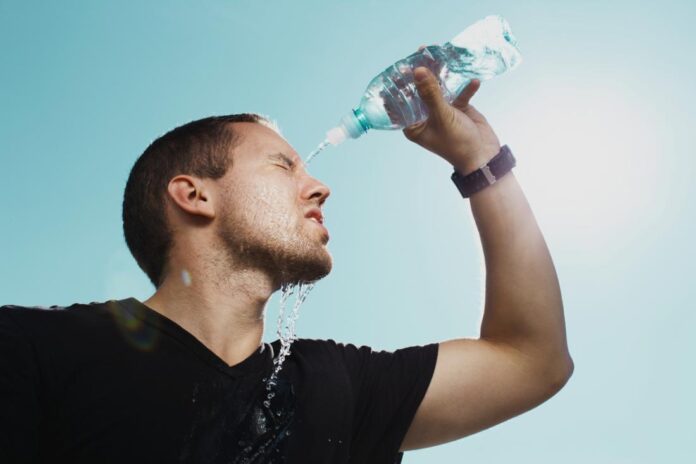Walking in the hot sun can be a fun and enjoyable experience, but it’s important to take precautions to avoid dehydration and heat stroke. Here are a few ways to reduce the risk of these conditions:
Drink plenty of fluids, especially water, throughout the day
Dehydration occurs when the body doesn’t have enough fluids to function properly. This can happen due to excessive sweating, vomiting, or diarrhea. Dehydration can lead to heat stroke, which is a potentially life-threatening condition. Symptoms of dehydration include thirst, dry mouth, dark urine, and fatigue. To reduce the risk of dehydration, it’s important to drink plenty of fluids throughout the day, especially water. Other beverages such as sports drinks can also help to replenish electrolytes. If you are outdoors in hot weather, take breaks in the shade and drink more fluids than usual. If you develop symptoms of dehydration, see a doctor immediately.
Avoid beverages that contain caffeine or alcohol, which can dehydrate the body
As the summer heat intensifies, it’s important to take steps to stay cool and hydrated. One of the best ways to do this is to avoid beverages that can dehydrate the body, such as caffeine or alcohol. While a cold beer or cup of coffee may seem refreshing, they will actually cause you to lose more fluids than you take in. In addition, sugary drinks like soda can also contribute to dehydration. So, when you’re looking for a way to beat the heat, stick to water or other non-caffeinated beverages. You’ll be glad you did when you stay hydrated and avoid heat stroke!
Dress in loose, light-colored clothing to help stay cool in hot weather
As summer temperatures start to rise, it’s important to take steps to stay cool and avoid dehydration. One simple way to do this is to dress in loose, light-colored clothing. Lighter colors reflect sunlight and help to keep your body temperature down, while loose-fitting clothes allow your skin to breathe and also help to regulate your body temperature.
Stay in air-conditioned areas as much as possible during extreme heat waves
During extreme heat waves, it is important to stay in air-conditioned areas as much as possible in order to reduce the risk of dehydration and heat stroke. If your home does not have air conditioning, you might want to consider AC installation or consider spending time at a friend or family member’s house who does. You can also visit public places like libraries or shopping malls that are cooled by air conditioning.
Take breaks often if you are outside in the heat
Taking regular breaks if you are outside in the heat is a good way to stay cool and prevent your body from overheating. Staying in the shade as much as possible will also help reduce your risk of exposure to the sun’s harmful rays. If you are sweating excessively, make sure to drink plenty of fluids and replace electrolytes by consuming foods or drinks that are high in sodium. By taking these simple measures, you can help reduce your risk of dehydration and heat stroke.
Try to avoid strenuous activity during hot weather
Dehydration and heat stroke are serious risks during hot weather, but there are steps that can be taken to reduce the chances of becoming dehydrated or overheated. One of the key things to remember is to avoid strenuous activity during the hottest parts of the day. If you must exercise, try to do it early in the day when it is cooler outside.
Monitor your body temperature, and take a cool shower or bath if you start to feel too warm
As the summer heat continues, it’s important to stay hydrated and avoid heat stroke. First, it’s important to monitor your body temperature. If you start to feel too warm, take a cool shower or bath. This will help keep your body temperature down and prevent dehydration. Moreover, it is vital to seek medical attention immediately if you develop symptoms of heat stroke; symptoms of heat stroke include confusion, fainting, and seizures. If you develop any of these symptoms, call 911 or seek medical attention immediately. Dehydration is also a serious concern in hot weather.
Stay safe and healthy this summer by following these tips for avoiding dehydration and heat stroke. Drink plenty of fluids, take breaks in the shade, and be sure to check on elderly or at-risk loved ones regularly during hot weather. Most importantly, have fun! Get out there and enjoy the sun (responsibly).






